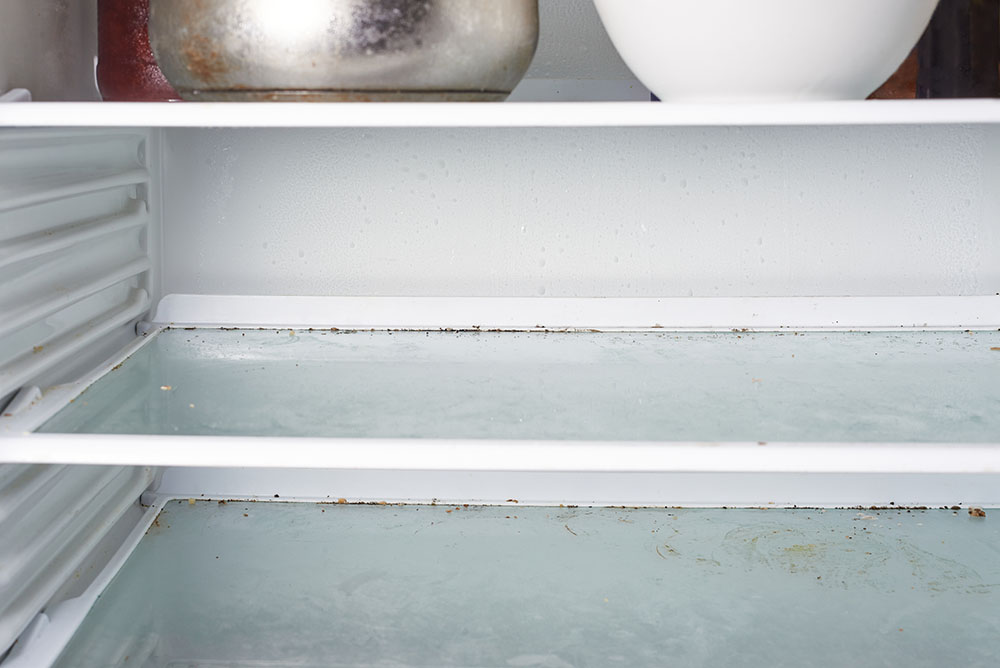How To Clean Mould From A Fridge

CONTENTS
- Understanding mould and its implications for refrigerator hygiene
- The science of mould growth in cold environments
- Preventative measures to stop mould growth
- The role of refrigerator maintenance in mould prevention
- Safe food practices to minimise mould risk
- Implementing a fridge hygiene routine
- Recognising when professional help is needed
- Frequently asked questions
- Get in touch
Mould can be a serious health hazard, so it is important to regularly clean your fridge to ensure that it remains hygienic and free from harmful contaminants. Once it starts growing in food storage areas, you may be discarding food and spending more money on food than you should.
At ICE Cleaning, we can discover the root cause of mould in your fridge with our mould remediation services. Our technology and industrial-grade solutions allow us to identify the type of mould in your fridge, eliminating it and preventing its return in the future.
Read on to learn how to take control of mould and remove the spores for good.
Understanding mould and its implications for refrigerator hygiene
Mould in your refrigerator can pose real threats to food safety and the health of your appliance. The most common culprits of this are Aspergillus, Penicillium, and Cladosporium, which we have previously explored in a guide.
Your refrigerator can develop into a miniature ecosystem where humidity levels are high enough to provide a welcoming environment for mould growth. Under the right circumstances, mould has the ability to rapidly develop in an ideal area, even within a colder environment.
Mould can cause your cooling system to work harder, increasing energy bill costs. Therefore, maintaining cleanliness and prolonging the lifespan of your food is integral.
The science of mould growth in cold environments
It may be surprising, but your refrigerator can harbour mould spores, providing leftover food and water seepage.
Spores enter your fridge by attaching themselves to warm air as you open and close the door, resulting in the clash between the cold internal air and the warm external air, creating condensation, which is ideal for mould.
Mould does not require heat to thrive; it merely requires a bit of moisture and something to consume. Some types of mould can grow happily inside your refrigerator despite the lower temperature.
Preventative measures to stop mould growth
To prevent mould growth in your fridge, start by reducing the humidity and controlling the temperature.
Some products act as dehumidifiers for your fridge, which may help with this issue. A DIY alternative is to place an open box of bicarbonate soda in the fridge to change monthly. Other things you can do include:
- Checking the door seal for any tears or damage
- Ensuring the fridge temperature is 4°C to 5°C
- Not leaving the fridge door open for too long
- Letting food cool before placing it in the fridge
- Ensuring you store food and liquids in refrigerator-safe containers
The role of refrigerator maintenance in mould prevention
The proper maintenance of refrigerators plays a critical role in preventing the growth and spread of mould. Mould thrives in moist environments, making the interior of a refrigerator a prime location for it to develop. Regular cleaning and maintenance can reduce the risk of mould growth.
One of the steps in preventing mould is to keep the refrigerator clean and dry. Maintaining a mould-free refrigerator requires continuously cleaning the inside using an anti-mould solution and responding quickly to any messes or water seepages.
In addition to cleaning and temperature control, you must maintain proper airflow within the refrigerator. You can do this by not overpacking the refrigerator and ensuring that items are correctly spaced, allowing for proper ventilation.
By following these simple maintenance guidelines, individuals can significantly reduce the risk of mould growth within their refrigerators.
Regular cleaning, proper temperature control, and adequate airflow are essential in mould prevention, protecting both the longevity of the refrigerator and the health of those who use it.
Safe food practices to minimise mould risk
Practising safe food handling and storage practices in your kitchen can help reduce the risk of mould development and ensure the safety of those consuming the food.
Proper food storage is crucial to ensuring that mould growth does not occur. To achieve this, use airtight containers to maintain freshness and avoid moisture accumulation.
Additionally, frequently inspect and dispose of any expired or damaged food supplies to decrease the possibility of mould development.
Proper handling techniques are also essential in reducing the risk of mould growth. This includes washing hands thoroughly before handling food and using separate cutting boards and utensils for raw and cooked foods.
Cross-contamination is a significant risk factor for mould growth, so it is important to ensure proper food handling.
Proper cooking techniques are also essential in reducing the risk of mould growth. Cooking food to the appropriate temperature can help kill any bacteria or mould that may be present, minimising the risk of contamination.
Properly reheating leftovers is also important, as improperly reheated food can provide a breeding ground for mould and bacteria.
By following these guidelines, individuals can minimise the risk of mould growth and ensure the safety of those who consume their food. Proper storage, handling, and preparation techniques are key components in safe food practices and reducing the risk of mould and bacteria.
Implementing a fridge hygiene routine
Staying on top of fridge cleanliness can prevent any surprise mould growth. Start by marking your calendar for a weekly fridge inspection; this will be your regular defence against mould infestation.
Clean shelves and drawers with eco-friendly cleaning solutions to maintain freshness. These cleaners are kind to the planet and tough on grime.
You should rotate any food leftovers and check dates often. If you spot mould, you must seek help from specialists who know how to eliminate mould.
Recognising when professional help is needed
In certain instances, it is possible to come across mould that overcomes all your preventative measures. In such cases, we recommend that you seek out professional assistance.
If you happen to stumble upon mould, it is important that you do not attempt to handle it on your own. Certain varieties of mould can cause severe illness when aggravated.
Frequently asked questions
Is it safe to use a fridge that has mould in it?
After a thorough cleaning, you can safely use the fridge. Just make sure no mould lingers.
Can you get mould out of a fridge?
You should contact a professional mould removal service to do this for you.
Why is the inside of my fridge mouldy?
Mould in your fridge could be due to food debris left behind or excess moisture.
How do I stop mould growing in my fridge?
Dry surfaces, store food properly, and observe humidity levels to fend off mould growth.
Get in touch
Our mould cleaning services at ICE Cleaning are paving the way for mould removal in the UK. Our technicians are fully-trained and educated on the science of mould, using their tools and solutions to remove mould and prevent its return.
Our friendly support team are available 24/7, 365 days a week, and can provide you with more information regarding our mould remediation services. You can get in touch today to book your free site survey at 0208 066 0360 or enquiries@icecleaning.co.uk, where we will provide a no-obligation quote the same day.

Speak with me today,
I’m here to help
By asking you a few questions either via phone or email I can immediately provide a realistic estimation of the cost.
You’re in good company. We’ve cleaned for the following commercial clients… View all

Why choose us?
- Cater to a wide variety of cleaning situations
- Nationwide coverage, available 24/7
- Cater to commercial and domestic clients
- Free survey provided prior to quotation
- Emergency response team
- Offer a bespoke service designed to suit all your needs
- All technicians hold professional health and safety qualifications, including BICSc, IOSH, Dewpoint Professional & Safe Contractor
We’re fully accredited
We place best practise, professional expertise and health and safety at the core of our business. We’re fully compliant with all legal obligations. You can view a list of our accreditations below, or visit our Health & Safety page for more information.











-RGB-small.1707319151.jpg)




















